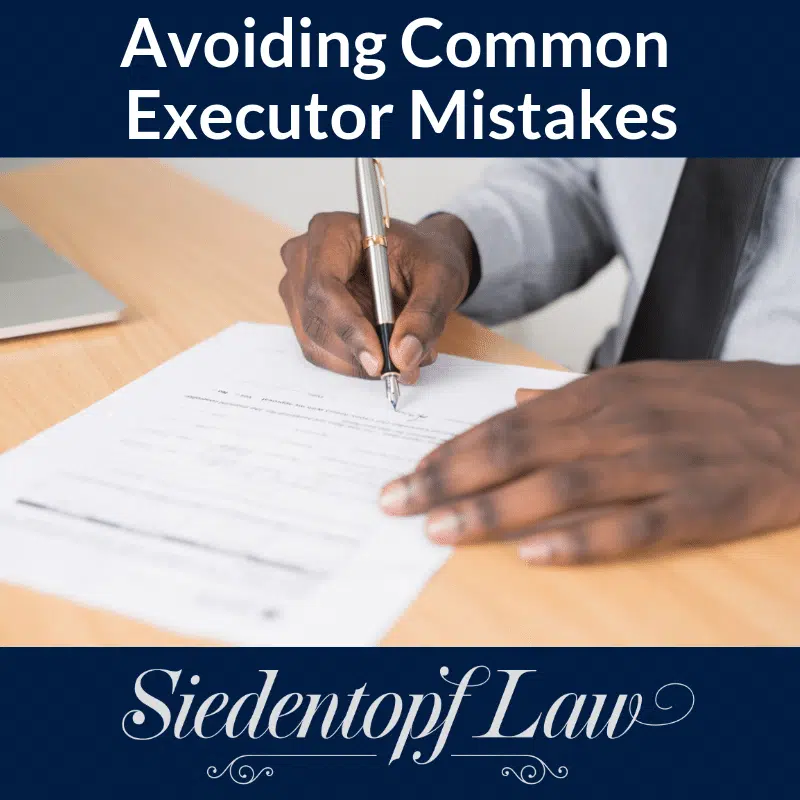It may seem like estate executors have an endless list of tasks and responsibilities; however, Siedentopf Law has some advice on avoiding the most common executor mistakes.
Have you recently learned that a friend or family member wants you to serve as their estate executor, or that you have been named an executor in someone’s will? On one hand, serving as an executor can feel like an honor; it is a role of trust and an opportunity to honor a person’s final wishes. But on the other hand, you may feel overwhelmed by the selection.
An executor is a fiduciary named in someone’s Last Will and Testament who handles an individual’s estate after their death. In general, this can entail probating the will, collecting and distributing the person’s assets, and paying off any debts or administrative expenses. There will be court documents and tax returns to be filed, financial and legal professionals to be consulted, and potentially some frustrated family members to deal with. This may seem like an endless To Do list; however, Siedentopf Law has some advice on the most common mistakes to avoid while serving as an estate executor.
Failing To Act
It happens more often than you would think. A person agrees to serve as someone’s executor, but when it comes time to actually probate the will and distribute assets – the executor refuses to act, despite pleas from the beneficiaries and/or the probate attorney. As an executor, it is your job to close the estate, the sooner the better for everyone involved. Ignoring responsibilities will only make the situation worse. If you feel like you do not have the skills or personality traits needed to serve as an executor (organized, patient, detail-oriented, etc.) then you should re-consider being that person’s estate executor in the first place. For more on this topic, read our blog Should I Accept The Role As Executor?
Ignoring or Prioritizing Beneficiaries
Another part of your responsibilities as executor is to act as a fiduciary to all of the beneficiaries and keep them updated about the estate and probate process. Dividing assets can be stressful, depending on the family dynamics, and you may be tempted to ignore certain beneficiaries or “play favorites” with others. But executors should be comfortable handling disagreements and tempering emotions if needed. Ignoring or favoring beneficiaries will just cause more problems, and if you do not keep everyone reasonably informed, the beneficiaries could ask the probate court to remove you as executor.
Forgetting That You Are Personally Liable
An executor is a fiduciary named in someone’s will to handle that person’s estate and their wishes after death. As a fiduciary, you have a legal and ethical relationship with the testator (the person who created the will) and agree to provide the highest standard of service, act “in good faith,” and avoid conflicts of interest. This relationship is all about trust and putting other’s needs above your own. If things go wrong with the probate process or the closing of the estate, the executor may be held personally liable. Depending on the situation and the severity of the issue, the court could require the executor to personally pay for any damages caused by his or her actions, or from their lack of acting in good faith.
Not Hiring An Estate Planning And Probate Attorney
As an executor, you can hire accountants, tax preparers, real estate brokers, and estate planning attorneys to help you settle the estate. Executors are not expected to possess these skills and they can use estate funds to help pay the professionals – the money does not have to come from their own pockets. It is a good idea to hire an estate planning attorney, someone who is up-to-date on the state’s law and is familiar with the probate process and any potential obstacles. Additionally, once you hire an attorney, executors should not be overly concerned about speaking with them because of the attorney’s fees. You are relying on the attorney representing you, and as such, you should be comfortable coming to them with questions and concerns. Asking questions as they arise can mean avoiding costly mistakes caused by guessing wrong about the answer to your question.
If you have additional questions about serving as an estate executor or if you would like to set up an estate planning consultation, contact Siedentopf Law via our website at EstateLawAtlanta.com or by calling (404) 736 – 6066.
© Sarah Siedentopf and Siedentopf Law, 2019. Unauthorized use and/or duplication of this material without express and written permission from this site’s author and/or owner is strictly prohibited. Excerpts and links may be used, provided that full and clear credit is given to Siedentopf Law and EstateLawAtlanta.com with appropriate and specific direction to the original content.








